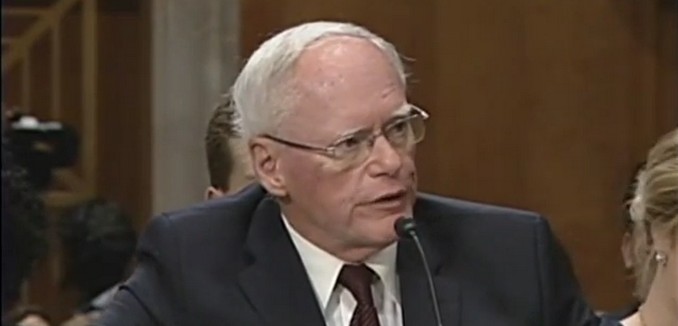A retired ambassador with multiple postings in the Middle East warned the Senate Foreign Relations Committee on Wednesday that Iran remained a threat to destabilize the region and that a nuclear agreement would not signal “a change of heart about its ultimate hegemonic goals.”
Jennifer Rubin of The Washington Post reported on the hearing on Thursday.
Ambassador James Jeffrey told lawmakers that despite the administration’s attempt to cordon off other issues, “the agreement cannot be considered outside the context of Iran’s record of destabilization in the region.” We have seen Iran become increasingly bold as the talks have progressed. “Two Middle Eastern states either have acknowledged, or are widely believed to have, possession of nuclear weapons,” Jeffrey said. “But the region’s leaders do not lose sleep over these weapons, nor does the UN Security Council pass multiple Chapter VII resolutions about them, as with Iran. The reason is that Iran’s behavior in the region is profoundly troubling to many states. Either an Iranian nuclear weapons capability, or an Iran politically empowered by an agreement that stops it just short of such a capability, would pose extraordinary new threats to a region already under stress, and undermine the above U.S. vital interests.”
Moreover, the idea that a nuclear deal will transform Iran into a responsible state actor is without foundation. “Iran is a revolutionary power with hegemonic aspirations. In other words, it is a country seeking to assert its dominance in the region and it will not play by the rules . . . Iran, however, has brazenly defied (the) international order and continues to expand its reach,” he said, reciting an earlier op-ed. “Any decision on the Iran nuclear deal must bear this sobering fact in mind, and must not read Iranian willingness to sign an agreement as a change of heart about its ultimate hegemonic goals.” He added later, “It begins with the idea do we think that signing this agreement is going to either flip Iran into being a status quo power in the region or serve as some kind of encouragement that that will happen over the longer term? I see no evidence of that given Iran’s past and given its ideological and religious role in the region and the very strong efforts it has made . . . to have a hegemonic position in the region.”
Jeffrey, a former ambassador to Turkey and Iraq, also stated the he believes that it will be possible to convince the rest of the world to keep most existing sanctions in place if Iran fails to keep to its word about the terms it has agreed to.
He rejected the idea it was this deal or nothing: “It is not beyond the skill of U.S. diplomacy, were Iran to walk away from the deal struck in early April, to persuade other countries to keep the current oil and other international sanctions in place. Additional international sanctions would however be difficult to impose in all but an egregious case of Iranian provocation, but retaining the current sanctions would be a heavy price for Iran to bear. . . .The U.S. would still have its direct sanctions, UN sanctions (as lifting them is subject to U.S. veto), banking and commercial pressure points, and perhaps some residual third country limits on importing of Iranian oil. Between these two variants — Iran refusing anything like the April outline, or the U.S. not accepting it — there are various scenarios, each with more or less difficulty in maintaining sanctions and other international pressure on Iran.” As for our allies, he notes that they remain uneasy because experience has taught them not to rely on what this president says. He recommends, “What these states need is a commitment by the U.S., backed at this point by action, that Washington will use all the tools in its arsenal, including military, to combat and drive back illicit Iranian efforts to infiltrate and undermine Arab states throughout the region. This includes pushing back on Iran’s actions in Iraq, Syria, Yemen, Lebanon, and Gaza.” However, as we all have learned, the president does not have much stomach for such commitments.
Jeffrey’s complete prepared testimony is here. In his testimony, Jeffrey referred to a New York Times op-ed that he coauthored in April, arguing that a nuclear deal would not curb Iran’s “imperial ambition.”
[Photo: SenatorIsakson / YouTube ]




